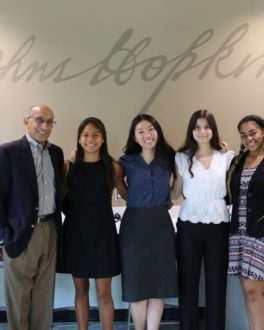November 19, 2019

This summer, high school, undergraduate and graduate students had the opportunity to take part in research internships and apprenticeships at Johns Hopkins University labs as part of our Research and Engineering Apprenticeship Program (REAP) and our Undergraduate Research Apprenticeship Program (URAP). REAP is a summer program that places talented, priority population high school students from groups historically under-represented in STEM in research apprenticeships at JHU. For students already enrolled in college, URAP offers a science and research experience alongside university researchers that prepare students for the next steps of their careers, and then connects them with mentors at their home universities to continue learning and receiving guidance from expert researchers.
Each student’s experience is unique, as their research projects are tailored to their STEM interests:
At the Hopkins Extreme Materials Institute (HEMI) at Johns Hopkins University (JHU), these students spent their summers learning state-of-the-art research techniques at top-notch laboratory facilities. Each summer, JHU hosts the Research and Engineering Apprenticeship Program (REAP) and Undergraduate Research Apprenticeship Program (URAP) providing students with valuable insights into university-led research that leave a lasting impression.
Nia Lowery, a student from the Heart Christian School in Suitland, Maryland was one of the applicants chosen to participate in REAP. Her project, titled “Investigating the Nudged Elastic Band (NEB) Method with a Reaction Mechanisms Database,” investigated the spring forces that balance the potential force and energy that help everyday objects find minimal energy pathways (MEP). Nia created a novel database for this project that will allow scientists across the field to better understand how NEB works and improve industrial chemical processes while lowering experimental costs. Still in high school, Nia is already contributing to the work of researchers around the world!
Like Nia, Michelle Sten used her summer in REAP to improve future research. “Centrifuge-less Layer-by-Layer Deposition on Particle,” Michelle’s project, responded to the increased interest in the creation of layer-by-layer drug delivery systems. Layer-by layer drug systems include the use of films that allow for controlled, timely drug release. This approach can decrease the toxicity of certain drugs, creating drugs that are both fast-acting and long-lasting.
Matthew Koelle, a student at Rutgers University, focused his URAP project – which he conducted with the help of Rutgers professor Richard Haber – on the “Survey on Wetting of Boron Carbide.” Materials that wet Boron Carbide may be useful for creating intergranular films, which play and important role in the mechanical and functional properties of many mineral systems. These films are commonly utilized in high strength ceramics to increase fracture toughness or wear resistance.
Sohan Mugi, a student from the Georgia Institute of Technology in Atlanta, spent his summer at URAP conducting research on compound relationships. His project, “Relationship between Rolling Process Parameters of Magnesium-Aluminum Alloys and Their Corresponding Vickers Hardness Levels,” highlighted the important role magnesium-aluminum alloy plays in the functionality of various structures and machinery – a field in which research is limited. Sohan’ findings can be used to provide a better understanding of the effect of rolling process parameters on mechanical properties of MgAl alloys, along with propelling future research on other types of plastically deformed alloys.
Take a look at all 20 students’ immersive research projects by reading the full HEMI summer program report here.
JHU hosts the Research and Engineering Apprenticeship Program (REAP) and Undergraduate Research Apprenticeship Program (URAP) providing students with valuable insights into university-led research that leave a lasting impression.
Find a Volunteering Opportunity
Visit our Program Volunteers page for a tool to find the best opportunity for you.
eCYBERMISSION Grants
The eCYBERMISSION Mini-Grant is intended to support teachers/program leaders as they implement eCYBERMISSION with their teams. Educators (formal and informal) of students in grades 6-9 are encouraged to apply. Special consideration is given to Title 1 schools and to those with underserved/ under-represented populations.
